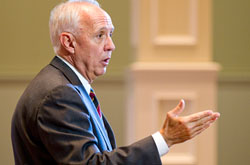College of Medicine Movie
View anniversary slideshow
By Ron Hartung
Oct. 8, 2010
Darrell Kirch, guest speaker at the College of Medicine’s capstone 10th-anniversary event Oct. 7, offered congratulations for 10 years of innovation – and challenged his audience to join him in transforming the nation’s health system into one that truly responds to patients’ needs.
 “I can’t say enough good things about what you’ve accomplished,” said Kirch, president and CEO of the Association of American Medical Colleges. “The problem is now we need to extend it to other medical schools and to the entire health-care system.”
“I can’t say enough good things about what you’ve accomplished,” said Kirch, president and CEO of the Association of American Medical Colleges. “The problem is now we need to extend it to other medical schools and to the entire health-care system.”
Kirch took his listeners, both on the main campus and by webcast at the college’s regional campuses, on a lively tour of the past century of American health care. He showed how the U.S. – despite great advances in medical knowledge and education – has created a culture that discourages patient-centered care. Add in the recent health-reform act and the downturn in the economy, Kirch said, and you have a system in urgent need of change.
“Who is going to fix this?” he asked. “You need to have some of the best minds in the nation who understand how you deliver health care, how you educate health professionals and how you study – do research on what works and doesn’t. You need to have those come together, and they come together in academic medicine.”
He described a recipe for change that has six ingredients – and he said he had seen all six ingredients at work during his two days at the College of Medicine. Those ingredients are:
 A mission statement that you actually intend to fulfill. “You have the most focused mission statement I’ve ever seen for a medical school,” he said. “And you’ve been relentless in every one of your programs to line up your activities with that mission statement.”
A mission statement that you actually intend to fulfill. “You have the most focused mission statement I’ve ever seen for a medical school,” he said. “And you’ve been relentless in every one of your programs to line up your activities with that mission statement.”- Integrated, interactive leadership. “You are displaying integrated leadership,” Kirch said. “Dean [John] Fogarty is a very, very talented person, but he could never get that mission fulfilled as a commander. He could only do it surrounded by a group of like-minded leaders. I saw leadership from the students today when I saw some of the things that they do in your outreach programs. It’s not a single leader; it’s widely distributed leadership.”
- Teamwork. “Everywhere I’ve looked in this College of Medicine, I’ve seen teams,” he said. “Your Learning Communities are teams, right? It permeates the curriculum. Your outreach programs are team-based. You understand it’s the power of the team, it’s the wisdom of the team. None of us, as an individual, can get it done.”
- A focus on results. “What I’m impressed by is you’re actually saying not just, ‘Are we doing good things?’ but ‘Are we really delivering on what we promised – what we promised when we were established and what we say in our mission statement, what we say to our students when they apply?’ You’re measuring your results in line with your promises.”
- Medical ethics. “When you have expansive areas of Florida where people can’t even get to health care, when you have people searching in vain for decent primary-care homes, that’s not a just health-care system,” Kirch said. “So it isn’t a political issue; it is an ethical issue for any of us who have any concern about health care.”
- Courage. “You know, some of you as med students – especially those in the early years – showed some real courage coming to a start-up medical school,” he said. “The faculty who came here showed some real courage. President [Sandy] D’Alemberte clearly was a courageous leader. [Sen. Durell Peaden Jr.] showed courage with an idea that was swimming against the stream of the times. We’re at a time in our country when I fear courage is in short supply. But I know where we need it most is in fixing our health-care system and training the next generation of physicians to be our partners in doing that.”
Kirch’s final words to his audience: “You’re doing a wonderful job; we have a lot of work left to do. I really look forward to joining you in that task.”


